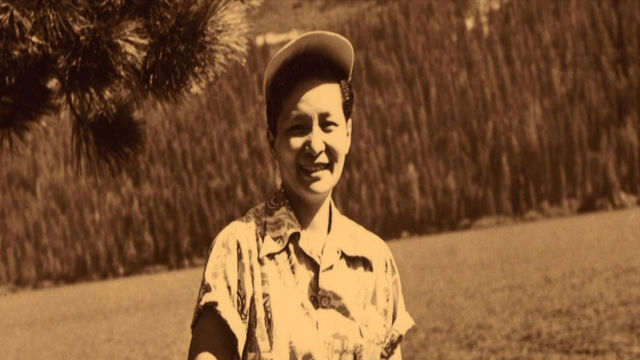
The World of Dong Kingman / Golden Gate Girls
- This is a past program
Presented by the UCLA Film & Television Archive. Learn more at cinema.ucla.edu.
In person: Q&A with Golden Gate Girls director S. Louisa Wei and UCLA School of Theater, Film and Television Professor Amy Villarejo.
Golden Gate Girls by S. Louisa Wei and The World of Dong Kingman by James Wong Howe document the lives and work of Chinese American artists. Golden Gate Girls surveys the career of pioneer female filmmaker Esther Eng, and The World of Dong Kingman follows a day in the life of renowned painter Dong Kingman. These artists' careers span decades between China and the United States and are carefully depicted in these portrait documentaries.
Documentarian Wei teamed up with fellow filmmaker and critic Law Kar to unbury the legacy of Chinese American filmmaker Esther Eng in Golden Gate Girls. The closest living family member to Eng, her sister Sally Ng, shares anecdotes of Eng’s career with Wei helping to piece together a portrait of her life. Eng directed 11 films in China and the U.S., but unfortunately most have been lost.
Unlike the investigative process involved in Golden Gate Girls, Howe had close contact with painter Dong Kingman. Howe intimately films him painting on the streets of New York City, as well as at home with his family. Howe was born in the Canton province of China in 1899, but moved to the United States with his family five years later where he grew up and went on to have a prolific cinematography career. Dong Kingman was born in Oakland, California, but moved to Hong Kong at the age of five where he studied watercolor painting and calligraphy before returning to the U.S. as a teen.
These documentaries pay homage to the artists they portray and preserve their legacies. Watched together, the films provide a wider look into the lives of artists from the Chinese diaspora in the mid-20th century.
The World of Dong Kingman (1953)
James Wong Howe photographed over 130 movies from 1923 to 1975 but this is one of the few instances in which he also directs. Following watercolor legend Dong Kingman at work, painting on a busy street corner of New York City, the film doesn’t overwhelm with the chaos of city life. Transfixed onlookers watch as Kingman slowly adds color and life to his canvas. Howe studies Kingman carefully, showing how his gentle brushstrokes fill the screen. Accompanied by classical Chinese music, the viewer immerses fully into Dong Kingman’s world.
Digital, color, 16 min. Director: James Wong Howe. Screenwriter: Tom Prideaux. With: Dong Kingman.
DCP, color, in French with English subtitles, 97 min. Director: Jean-Pierre Bekolo. Screenwriter: Jean-Pierre Bekolo. With: Adèle Ado, Dorylia Calmel Emile, Abossolo M'bo.
Golden Gate Girls (2013)
Esther Eng was one of the very few female filmmakers of her era, one of the first Asian American female directors, and an openly gay woman in the 1930s. Though a trailblazer, Eng was largely forgotten and most of her films are lost. In S. Louisa Wei’s documentary, the story of Eng’s career is pieced together with family memories, testimonials and the remarkable discovery of her photo albums. Wei compares Eng’s career with that of Dorothy Arzner, fellow queer female filmmaker who carved her own career in Hollywood as a film director from 1927 through 1943, and whose work was rediscovered in the 1970s by feminist film scholars.
DCP, color, 90 min. Director: S. Louisa Wei. Screenwriter: S. Louisa Wei. With: Esther Eng.
The UCLA Film & Television Archive is a division of UCLA Library, and presents its public programs in the Billy Wilder Theater at the Hammer, among other venues. For more information about the Archive, visit cinema.ucla.edu.
ATTENDING THIS PROGRAM?
Ticketing: Admission to Archive screenings at the Hammer is free. Your seat will be assigned to you when you pick up your ticket at the box office. Seats are assigned on a first come, first served basis, limit one per visitor. Box office opens one hour before the event. Questions should be directed to the Archive at programming@cinema.ucla.edu or 310-206-8013.
Member Benefit: Subject to availability, Hammer Members can choose their preferred seats and pick up tickets for one additional guest. Members receive priority ticketing until 15 minutes before the program. Learn more about membership.
Parking: Self-parking is available under the museum. Rates are $8 for the first three hours with museum validation, and $3 for each additional 20 minutes, with a $22 daily maximum. There is an $8 flat rate after 5 p.m. on weekdays, and all day on weekends.
Read our food, bag check, and photo policies.
Read our COVID-19 safety guidelines.


